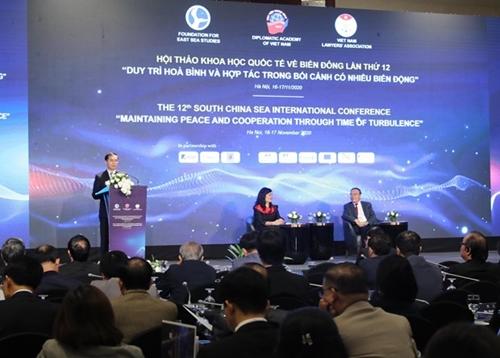Ambassador Nguyen Hong Thao, Second Vice Chairman of the U.N. International Law Commission, made the statement on the sidelines of the 12th South China Sea International Conference, themed "Maintaining Peace and Cooperation through a Time of Turbulence," which took place on November 16 in both in-person and online formats.
    |
 |
|
The 12th East Sea international conference takes place in Hanoi on November 16-17. |
Jointly held by the Diplomatic Academy of Vietnam (DAV), the Foundation for East Sea Studies (FESS), and the Vietnam Lawyers' Association, the two-day conference attracted over 700 delegates, including nearly 60 prestigious experts from 30 nations, 12 ambassadors and representatives from over 20 foreign representative offices in Vietnam, and nearly 100 domestic and foreign journalists.
He said at both 36th and 37th ASEAN Summits, leaders agreed that the only and consistent legal basis to resolve the East Sea issue is the United Nations Convention on the Law of the Sea 1982 (UNCLOS 1982). He expressed his hope that all countries will accelerate the negotiation and enactment of a Code of Conduct in the East Sea (COC), which regulates all maritime behaviors among the parties involved for a peaceful, stable and prosperous East Sea region.
Mentioning a series of debates regarding more than 30 East Sea-related notes at the United Nations, Thao said that the situation in the East Sea has changed a lot since Malaysia submitted its extended continental shelf limits in the East Sea to the the Commission on the Limits of the Continental Shelf in December 2019.
The ambassador said that the submission of notes on the East Sea by countries outside the region is a change of perception of the international community. "I think that the world will need to recognize the role of UNCLOS 1982 and countries will come together to find solutions to the East Sea issues," he added.
Thao expressed his belief that despite many disagreements, with solidarity in ASEAN as well as awareness of international law, a tool for dispute settlement, the parties will gradually approach a solution that is acceptable to all.
Assessing the East Sea situation in the current context, Dr. Tran Cong Truc, former head of the Government Border Committee, said that the East Sea now becomes an international issue as countries have raised their voices by not only diplomatic statements and bilateral notes but also notes sent to the UN bodies. Notably, in those notes, for the first time, countries have mentioned the compliance with UNCLOS 1982.
"This is very important, because it clearly shows that Vietnam and other countries have the same view regarding the two archipelagos of Hoang Sa (Paracel) and Truong Sa (Spratly) which China calls Xisha and Nansha, and their entities,” he said. According to UNCLOS 1982, it is impossible to build, establish or announce the baseline as an archipelagic state. It is completely contrary to the Convention.
China’s "nine-dash line" claim is completely illegal and contrary to the provisions of UNCLOS 1982, policies on external affairs and protection of the legal rights of countries in the East Sea, he noted.
Regarding the COC negotiation process, Truc said it has seen progress in terms of procedure. As the East Sea issue relates to not only ASEAN and China but also many other countries in the region and the world, the parties need to determine the subjects of the COC and its scope of adjustment. Therefore, it will take a long time to finalize the COC.
According to Ambassador Pham Quang Vinh, former Deputy Minister of Foreign Affairs, ASEAN's principles on the East Sea issue are peace, stability, security, safety and freedom of navigation. This is a very important for the region. All countries inside and outside the region have common interests in this region.
There are overlaps and disputes over sovereignty claims among the concerned parties, he said, stressing that the settlement of these disputes must be done by peaceful means, consultation and dialogue based on international law and UNCLOS 1982.
The ambassador also said that violations affecting peace and stability in the East Sea are those of common interest. Therefore, countries inside and outside the region must raise their voices on this issue.
"Any act that infringes on the continental shelf and exclusive rights of coastal states according to international law must be opposed. Not only those affected but also the whole ASEAN need to raise opposition,” he said.
Source: VNA